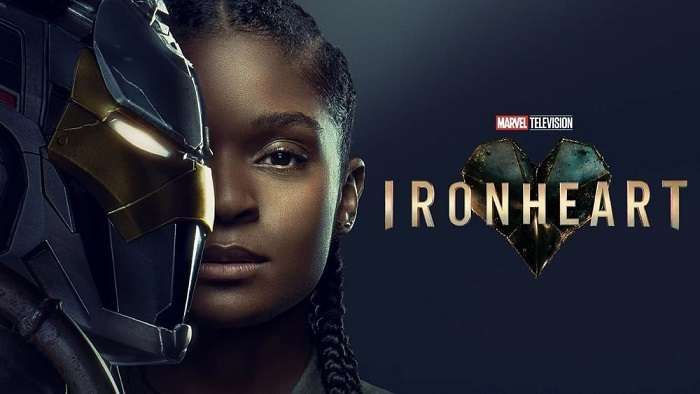IronHeart: Riri Williams Shines in a Gritty, Grief-Fueled Origin Story
- Eris Grey

- Jun 26, 2025
- 4 min read
Updated: Jun 27, 2025
Across the first three episodes, the newest MCU series, Ironheart, positions itself as not just another origin story but as a reclamation and declaration that intellect, grief, and determination can coexist without compromise and that a young Black woman can occupy the suit and the screen without being simplified.

Riri Williams (Dominique Thorne) is drawing the generic haters online, the usual suspects who tragically 'review bomb' TV shows (in most cases, the MCU and Star Wars universe) that celebrates strength in marginalized communities, in this case, these people fueled by hate have branded Riri, without reading the source material, a "Mary Sue", a term so overused by now (re: Rey in Star Wars, or more recently, The Acolyte) that is has lost its weight, especially that you never an alternative, like "Michael Steves" used to describe a white man of the same nature of skillset. Deplorable? Yes. Weak-minded and generic insults used to attempt to harm women? Also yes. The intelligence and competence double standard when it comes to heroes in the MCU is staggering. Riri Williams is a young genius who builds advanced tech, sounds like a certain Spider who built advanced tech in his bedroom, including web fluid, got recruited by Tony Stark and was not once called a Mary Sue. There was no questioning how a young kid from Queens would understand quantum physics or reverse-engineer tech; the audience just accepted it: a quirky, young white man is celebrated. A witty, young black woman is questioned. This isn't about character development. This is about who the audiences allow to be exceptional.
The reality is Riri Williams is brilliant, but she is also deeply human, and to overlook her mistakes in adjacent to her intelligence is juvenile thinking at best. She was expelled from school because she was plagiarizing her work for other people; this is not the act of a woman who would mysteriously have "everything" with no background on her character. She's not overpowered, she's not perfect, she's a woman navigating trauma, isolation and the pressure of filling a technological legacy.
Ironheart is touching on the use of AI, in this depiction, hers, N.A.T.A.L.I.E. is a reconstruction of her friend who passed in a deeply traumatic event. A heartbreaking coping mechanism that strikes fear into her at first, but slowly comes to terms with needing this artificial version of her deceased friend to aid her in the way she was programmed, except unlike Tony Stark's JARVIS or FRIDAY, NATALIE serves as an extension of Riri's past. A deeply emotional moment in tech saturation.

Where Tony Stark's journey was about redemption, Riri’s is about assertion—staking a claim not just to her identity, but to her right to exist fully in a space that often marginalizes or mythologizes brilliance when it comes in Black skin. They are not the same, so we need to immediately move past the narrative that they should be relatable.

The show's production is well done, Ante Cheng did a great job depicting a gritty atmosphere by bending tone and textures in this Chicago-set. There's a heavy contrast to the marvel sheen, something also used in Thunderbolts*, signalling that we are entering a darker, more intimate moment in the MCU. The pacing matches this, narrative-driven and a slow-burn, Ironheart is fleshing out its roots and creating character dynamics based on empathy and regret (Riri) and anger-based fear (Parker, played by Anthony Ramos). By episode 3, we start to see the deeper stakes of Riri's decisions, hinting at a conflict that hopefully expands the seemingly magical and technological tensions introduced in Wakanda forever.

There are flaws, some minor dialogue stumbles and pacing issues, a few characters that we can only hope get more dimension, but it's unique, it's well written, and it pulls at your heart without you fully realizing why. Casting director Sarah Finn did a remarkable job, pulling authentic casting in a world that unapologetically exists, making the intentional space for Black, POC, queer and trans. There's no exploiting identity; Ironheart allows these characters to exist fully formed without stripping away their gender or cultural identities. Shea Couleé, a Black nonbinary drag performer, and Zoe Terakes, a trans nonbinary actor, are part of this supporting cast—not to be “represented,” but to exist within the world Riri is building. Their inclusion is not a side plot, not trauma porn, not "lesson" characters. Its representation is done with respect and without spectacle, and I love it.
There are three more episodes of Ironheart, but the foundation is clear: we have a story about growing power. It's not trying to be Iron Man, it's forging its own arc, and I can't wait to finish it.
How do you like the first three episodes? Comment below.
Frequently Asked Questions
Q: Is Riri Williams based on a comic book character? A: Yes. Riri Williams first appeared in Invincible Iron Man #7 in 2016, created by Brian Michael Bendis and Mike Deodato.
Q: Why are people calling Riri a "Mary Sue"?A: The term is often misused to undermine female or marginalized characters. Riri is flawed, complex, and her skillset is well-earned.
Q: What makes Ironheart different from other MCU shows? A: It’s emotionally grounded, deeply rooted in Chicago, and unapologetically represents Black, queer, and trans identities.
Q: Who is N.A.T.A.L.I.E.? A: N.A.T.A.L.I.E. is Riri’s AI, modelled after her late friend. It’s both a technological tool and an emotional echo of her trauma and healing.




Comments